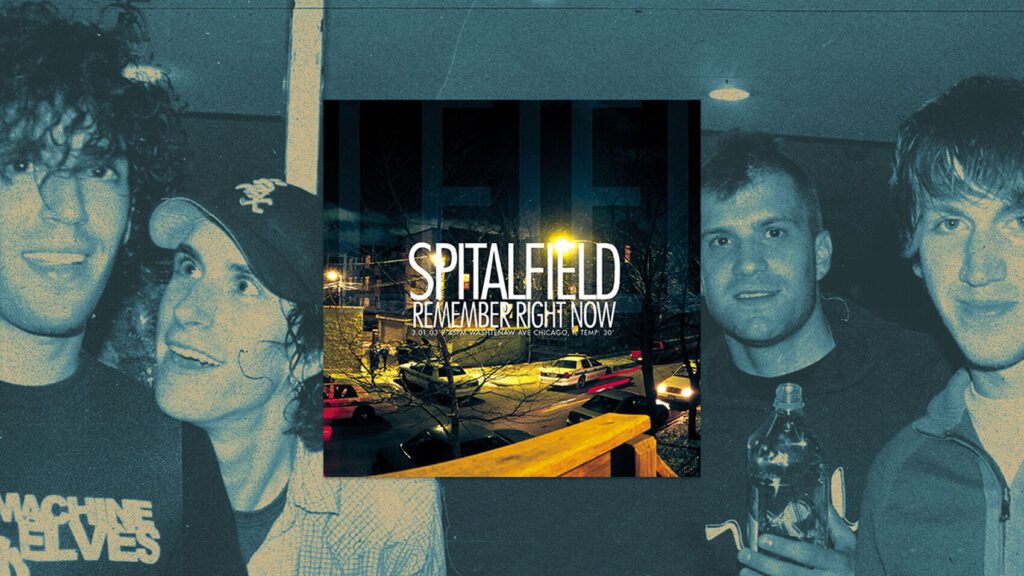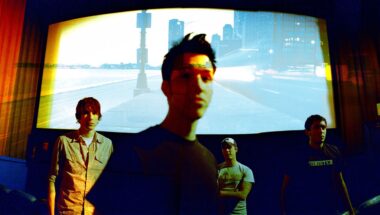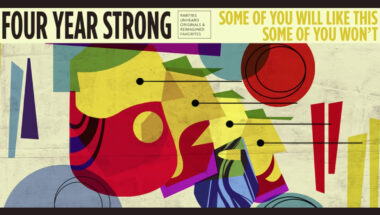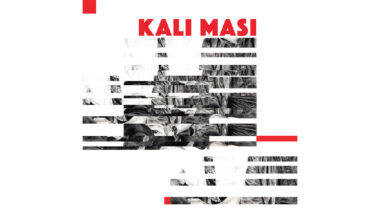Imagine it’s 2003. Doesn’t feel that long ago, right? Feel again: Facebook would launch the following year. The first iPhone came out in 2007. We started posting videos to YouTube in 2005. These tools we use every day — to communicate with each other, to stay in touch with the world, to entertain ourselves, to network socially — literally did not exist 15 years ago, when scrappy Chicago four-piece Spitalfield released Remember Right Now.
Despite being lumped in with the burgeoning emo-pop explosion taking place in suburbs across America — with labels like Vagrant, Drive-Thru and Fueled By Ramen selling CDs by the truckload — Spitalfield predated most of those upstarts who were landing artists on MTV and the cover of Alternative Press. Formed in 1998, during the much smaller but still vital second wave emo explosion that gave us such bands as the Get Up Kids, Braid, Piebald and Texas Is The Reason, Spitalfield’s influences were rooted in vintage post-hardcore and heart-on-sleeve songwriting, in contrast to the cheesy hair metal and commercialized pop-punk of the day. To put too fine of a point on it, Spitalfield’s first EP came out before Jimmy Eat World released Clarity.
It took a while, but Spitalfield became fully realized in 2003 when Victory Records took a chance on the buzzworthy hometown band. Gehr result? sophomore album, Remember Right Now, is a 10-song blast of expertly written, meticulously recorded and impeccably produced songs that, in a perfect world, would have launched Spitalfield into the stratosphere and put them alongside some of its platinum-selling scene mates. But just because that didn’t quite happen doesn’t mean the record still isn’t a vital part of third-wave emo, and it deserves to be celebrated.
Which brings us to this year’s Riot Fest. Spitalfield, who initially broke up in 2007 and briefly reunited for a tour in 2013, has been tapped as one of the bands to do a full playthrough this September at Douglas Park. We sat down with frontman Mark Rose to discuss the stories behind the album, and what he expects to happen in the future.
RIOT FEST: I’ve always felt like this is Spitalfield’s Chicago album, based on the lyrical themes as well as the artwork. Do you agree?
MARK ROSE: I definitely do, primarily because of what you just mentioned. The road to writing Remember Right Now and to releasing it, it captured that part of my life. When the band first started, we played basements and VFWs, and then we started taking it seriously and tried to find gigs regionally, a few hours out of town and stuff like that. By the time this record was being was being made, that was it. So it was a very Chicago thing.
Then when you get into the van and spend the next 18 months on the road, the dynamic changes. In a lot of ways, it’s a change for the better: As you get you get tighter, you get stronger, and your vision becomes more clear. But I feel like that initial step up to the plate, it’s like you you don’t really know exactly what’s going to happen but it’s all been building to that moment. And I think that what Remember Right Now is. That was actually a really great title which [guitarist] Dan Lowder came up with. I think it resonated with people.
You had been a band for five years before this album came out. Most bands nowadays don’t have that time to develop both as people and as artists before making their big-label debut. You had a half decade to figure out what you wanted to do. How important was that to creating what Spitalfield was in 2003?
It was very important, because we were able to go through a lot of the initial growing pains feelings, like, ‘What are we doing? Why are we trying to do it?’ Spitalfield started as a side project, because we were playing hardcore, and we heard the Get Up Kids and Texas Is The Reason. We wanted to do something like that, and our little local scene wasn’t entirely embracing anything like that. We were kind of a joke at first to a lot of people, but we realized this is something we wanted to do.
In 2003, the scene around you was gaining a lot of attention from mainstream outlets, and some of your Victory Records labelmates, like Thursday and Taking Back Sunday, had already sold hundreds of thousands of records. Did you feel like you were being misjudged or miscategorized?
At that time, there were these cliques of labels, and we were between a bunch of them. At that time, with the wave of press and media attention that Victory’s biggest artists were getting, we were able to benefit from that in certain ways when it came to cross promotion and raising awareness. But it was also maybe to a detriment because of who we were being associated with and what that meant to our potential audience. But that said, I realize now looking back that it’s like had we moved forward with a different label or had we moved forward a different team of people around us, there’s no knowing what would have happened.
But to answer your question, yeah, we were miscategorized regularly, but what can you do? It’s exhausting to try and defend yourself to say no, you’re not really hearing it the way we want you to, but music is music, and people are people. They find it how they find it. The people who carry the torch as are often the loudest.
Remember Right Now is the first release with what people consider to be the “classic” Spitalfield lineup of you, Dan, TJ Minich on bass, and JD Romero on drums. TJ was the most recent member to join; what did he bring to the band that you didn’t have before?
TJ had a lot of influence going into that record, because he represented this kind of spark. He had been playing in Knockout and various other bands, and we knew who he was and we always loved his attitude. But he brought this energy to the stage and he played bass like a guitar, because he was a guitar player by trade who picked up a bass and started writing some really awesome melodic basslines that I feel really helped define the sound on Remember Right Now. There was just there was just a different different level of musicianship going into the songs. Also, TJ had some insight to working with Sean [O’Keefe, RRN producer].
What made you want to work with Sean?
Sean had just done three demos for Fall Out Boy that got them signed to Fueled By Ramen, and then he made Take This To Your Grave. As far as local producers were concerned, we hadn’t heard that kind of leap before. We were thinking, “Wow, we’d love to hear what Sean could do with us, I wonder if he’d be interested.” And TJ had that connection.
Sean was looking to further his opportunities and career at that time as well. He had literally finished Take This To Your Grave three weeks before we entered the studio for Remember Right Now. If there were 24 hours a day, Sean was working 21 of them, especially when we were working in someone else’s studio. The experience with Sean was wild. We were very excited when he accepted the project. We had never been in a studio of that caliber.
The majority of all the rhythm tracks and a lot of the leads were done at Smart over the course of a week and a half. We did the majority of the vocals and post-production at Rosebud in Skokie. We did a lot of auxiliary stuff in interesting locations, like New Trier High School. Sean knew the band director, and we got to go in there and use the glockenspiel and bells and stuff. I think that’s another element that makes the record stand out. Part of that was our love for Jimmy Eat World, but also JD was in marching band for four years. He knew how to play those instruments.
How did you get Eric Remschneider on your record? He played strings on everything from Smashing Pumpkins’ “Disarm” to Plain White T’s’ “Hey There, Delilah.”
We knew we wanted to have strings on “In The Same Lifetime.” We had friends who could play strings, but Sean knew Eric and was able to get him to come in. He sat with us and listened to the track, and I told him my arrangement ideas and he was like, ‘Cool, I think I get the jist of it, lemme take a crack at it.” He created a whole ensemble just layering on top of himself.
The album itself sounds crystal clear and pristine. A rumor I heard back in the day was that Sean was so meticulous with your recording that he cut-and-pasted one part of song over and over, instead of using full takes of songs. Is there any truth to that?
It’s true that Sean is very meticulous about the locked feel, and not letting things push and pull. So yes, there was a decent amount of editing going on, but when it came to the performances, it wasn’t like that for us. It didn’t turn into the copy-and-paste show for the performances, but there is some studio magic there, which is definitely what a producer like Sean brings to the table.
Chicago was such a busy scene in 2003, from Alkaline Trio to Rise Against to Fall Out Boy, with plenty more bands trying to break through. It felt like there were some dividing lines throughout the scene. Did you ever feel like you had a rival?
There was a certain level of healthy competition when you’re all kind of in the same scene and going after the same crowds and hoping for the same tours. One thing I think in the big picture maybe hurt us is that we stayed out of it. Even if there were rumors flying around, we stayed out of the drama. It kind of kept us as an outlier. Maybe we could’ve benefitted from the buzz of having more drama.
Of course, the A side of Remember Right Now has “Kill The Drama.” But the B side has “Fairweather Friend.” It’s been 15 years — can we talk about who that song’s about yet?
[Laughs] I can’t really answer for TJ. We played it live very rarely. A lot of people like that song a lot, and people would bring up that song to me all the time as their favorite song on the album, and I would be like, “Ah, the TJ song.” [Laughs] He was taking some kind of dig at somebody, and it’s probably somebody that everybody knows.
One of the things I love about this album is the physical layout of the CD. What can you tell me about it?
The layout was important to a bunch of people. We wanted to work with [photographer] Chris Strong, because of our love of bands on Polyvinyl and Vagrant. That was probably, as a collective, closer to where we leaned than a Victory or a Drive-Thru. The other person this was important to was Jason Link, who is now the creative director at Epitaph, but this was his first full layout at Victory Records. It speaks to the concept of the record: working with people who were really hungry because they were getting a chance to do something on a bigger level. The band felt that way, Sean felt that way about producing, Jason felt that way about doing his first layout. Even the name Remember Right Now speaks to that. We didn’t feature ourselves in the layout of the record at all. It’s all about Chris’ pictures and Jason’s timestamps. Now it’s fun to flip through and look at those intersections in Chicago and see how everything looks different 15 years later.
It felt like there was already built-in nostalgia for “now.” You’re living for the moment, but you’re also recalling what you’re doing and playing on that idea of nostalgia. How important to you were those concepts?
Maybe that speaks to something we touched on earlier, which was having been a band for five years before that moment. Getting that opportunity, quitting our jobs, dropping out of college — it was exciting, it was overwhelming, but it was a big decision. I remember talking to my parents about it, saying I don’t know if I’ll ever get this chance again. They understood. A lot of people love the concept of dropping everything and making a go of your band, but I think they’re chasing something they don’t really want, because it’s scary. It’s scary to say goodbye to your family and friends and get in a van and just go.
When you’re 18, you’re excited, but you’re out of your comfort zone immediately. You’re driving 10 hours between shows overnight. You’ve got a cash box. You’ve got flip phones. It’s like, what are we doing? [Laughs] We were heavy on the nostalgia, because we were feeling it about our own path. I can’t help but think that a lot of those songs were optimistic, “Where is this taking us?” type stuff, feeling that energy and excitement… It still feels reflective, instead of being locked into that year.
It’s a self-referential album, too. You have “Stolen From Some Great Writer” sequenced directly after “I Loved The Way She Said L.A.,” which is a title directly lifted from Jack Kerouac’s On The Road.
We were in an era when song titles didn’t necessarily reflect the hook of the song. Fall Out Boy had all these super-long, witty titles. We kind of found ourselves in that with our next record [Stop Doing Bad Things], but on this record, it was a little more dialed in. But still, why didn’t we call it “California’s Not So Far” instead of “I Loved The Way She Said L.A.”? We thought it worked because we were on the road, in that beatnik way.
Another thing I love about the layout of the album is that it allowed you to print all of your lyrics, which you used as a way to deepen the stories behind each song by using quotation marks to indicate some lines were being spoken by someone else, as in “Kill The Drama.” Or you have “In The Same Lifetime” written in the third person, using the words “he” and “she” instead of “I” and “you.” Was that a fictionalized story, or did it mean more to you?
It is definitely a very personal song to me, but I thought it was fun and interesting to write in the third person. I’m a big lyrics person. Someone like Bob Nanna is so smart, he’s such a wordsmith. It’s one thing to know the syllables and pacing of the words, and it’s another thing to dissect the meaning of the words, and figure out where certain sentences begin and end, or where a play on words happens. That song was my attempt to do stuff like that.
In “I Loved The Way She Said L.A.,” you included the lyric, “When you wish upon a star.” Be honest: Are you secretly glad the song wasn’t a hit? Because if it would’ve been, then you probably would’ve gotten sued by Disney.
[Laughs] If Disney came after us, maybe that would’ve been the publicity thing we needed to get over the hump!
What is the lineup going to be for this performance?
Unfortunately, TJ wasn’t available to make this show, so TJ 2 [aka TJ Milici—ed.] is stepping up to fill his shoes. For his sake, he came on board right after Stop Doing Bad Things came out, when TJ was going through some stuff and had to leave the band. TJ 2 played on our third Victory record [Better Than Knowing Where You Are], too. TJ 1 gave TJ 2 his blessing to play at Riot Fest. He represents a big part of the band, too.
Since you finished the Remember Right Now 10-year anniversary tour in 2013, you played one show at Wicker Park Fest in 2015, but that was it. Is this Riot Fest show going to be closing the book on Spitalfield? Or is this a book that will never be closed?
That’s a heavy question. Even though I’m focused on my own songwriting and running Downwrite, Spitalfield is still a big part of my life. Part of that is because of the people I’ve met along the way, and part of it is because it’s why people know who I am at all. This might be the culmination of everything Spitalfield, because I can’t really imagine a scenario that is bigger or better than this. I don’t mean from a numbers standpoint, I just mean to play at this festival in Chicago celebrating this record. I can’t imagine where it would go from there.
I’m sure it will be a rush to be onstage pouring it all out, and when it ends, we’ll be a little sad, because it will be over. I wouldn’t say we’re closing the book forever, because I will never rule out what could happen with peoples’ lives, but when we did that anniversary tour, we never really kicked around the idea of writing new songs or anything. We just enjoyed reconnecting with old supporters and meeting new supporters.
I can’t believe it’s been 15 years since this record came out. It’s insane to me. I don’t think it’s closing the book, but I’m not sure how the story could continue. I’m excited for it. I’m really looking forward to Riot Fest.
What are your expectations for the show?
I’ve definitely gone through all the scenarios as far as what time we’re onstage, who we’re up against, what day we’re playing, what’s the weather like… There are so many things that could go right or wrong. But I’m not sweating it. The people who want to be there are going to be there. It’s just a great opportunity across the board. If we play to a small, excited crowd, what’s wrong with that? And if we get more people than we could ever imagine — there’s a chance that this is the biggest show we’ll ever play. We’re not going in with expectations of it being empty or by being huge. We just want to put on a good show.
Who are you going to be watching at Riot Fest?
Of course, I’m pumped that Piebald is playing. I always have fun watching them. I’m excited for Incubus. I have fond memories of seeing them with Deftones back in 2001. I think they’re such an interesting choice for Riot Fest to have on the bill — I love how eclectic this fest is. I wanna see what’s gonna happen with Jerry Lee Lewis, too. I think it’s badass that he’s gonna play. There’s no shortage of good stuff. If you’re a rock music fan and you can’t find a reason to enjoy Riot Fest, then I’m sorry for you.



